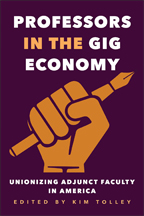
How to give non-tenure-track faculty the support they need
Two new studies address the challenges faced by growing numbers of contingent faculty.
They go by many titles. Adjunct professor, postdoctoral fellow, assistant lecturer, part-time instructor, researcher — The list goes on. All these titles make it difficult to gather comprehensive data about faculty, which in turn makes it difficult to see, let alone address, the challenges many of these higher education workers face.
That is the finding of a recent essay authored by Adrianna Kezar, co-director of the USC Pullias Center for Higher Education and Dean’s Professor of Higher Education at USC, and Tom DePaola, a research assistant at the Pullias Center, published in special issue of New Directions for Institutional Research on contingent faculty in higher educational institutions. Kezar and DePaola’s paper specifically looked at the the growing numbers of non-tenure-track research faculty and postdoctoral researchers to find that these workers are often overlooked by institutions when collecting employment data.
“Contingent academics like postdocs and research faculty receive less attention than adjuncts, but they face many of the same working conditions, and sometimes added problems. For example, it’s not uncommon to see research-only faculty forced to continually write grants to cover their own salaries if they wish to remain employed,” Kezar explained. “Too few research institutions gather adequate data on the conditions of nontenured, non-instructional faculty in their departments. That has to change.”
Kezar is the project co-director and principal investigator for the Delphi Project on Changing Faculty and Student Success, an initiative of the Pullias Center dedicated to enhancing awareness about the changing faculty trends using research and data to better support faculty off the tenure track and to help create new faculty models to support higher education institutions in the future.
“Contingent faculty now make up the majority, when just a few decades ago, this wasn’t the case,” Kezar said. “If anything, conditions have just gotten worse over the years as the ranks of contingent faculty swelled and academic career opportunities evaporated.”
 In a related recent publication, Kezar and DePaola examined one potential way contingent faculty might improve their working conditions: unionizing. Included as a chapter in a new book titled Professors in the Gig Economy: The Unionization of Adjunct Faculty in America (Johns Hopkins University Press, April 2018), Kezar and DePaola’s analysis looks at key working conditions that unions ought to focus on to better allow contingent faculty to excel at their teaching work, while calling on research universities to do a better job gathering data to understand and address these problems on their own campuses.
In a related recent publication, Kezar and DePaola examined one potential way contingent faculty might improve their working conditions: unionizing. Included as a chapter in a new book titled Professors in the Gig Economy: The Unionization of Adjunct Faculty in America (Johns Hopkins University Press, April 2018), Kezar and DePaola’s analysis looks at key working conditions that unions ought to focus on to better allow contingent faculty to excel at their teaching work, while calling on research universities to do a better job gathering data to understand and address these problems on their own campuses.
The chapter outlines some of the subpar working conditions that many contingent faculty members have to contend with, ranging from last-minute hiring to job insecurity. Those and many other specific issues need to be addressed, but institutions can’t simply implement a few policies and declare the problems fixed, the authors argue.
“It’s not just a question of values, it’s on the institutions to make changes that improve conditions and affirm the dignity of contingent faculty,” DePaola said. “We shouldn’t need empirical evidence to recognize that exploitation and toxic work environments aren’t a great way to foster quality or productivity.”
These new publications are part of the Kezar and DePaola’s ongoing research on changing faculty trends and the effects of those changes on student success. The authors are currently writing a monograph for Johns Hopkins University Press, to be released in 2019, that examines how contingency has spread to nearly every type of academic and nonacademic work on college campuses, and analyzes the disturbing implications of these trends moving forward.
___
DePaola, T. & Kezar, A. (2017). The Changing Face of Employment at Research Universities. New Directions for Institutional Research, 2017: 83-96. doi:10.1002/ir.20246
Kezar, A. & DePaola, T. (2018). Understanding the need for unions: Contingent faculty working conditions and the relationship to student learning. In K. Tolley (Ed.)., Professors in the gig economy: The unionization of adjunct faculty in America. Baltimore, MD: Johns Hopkins University Press.